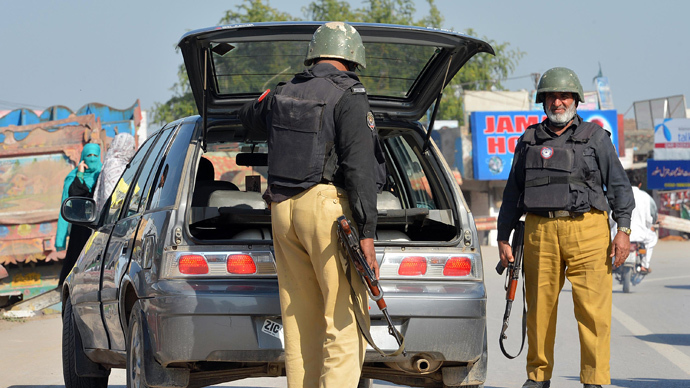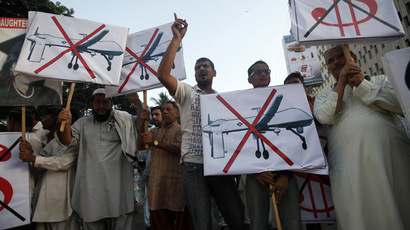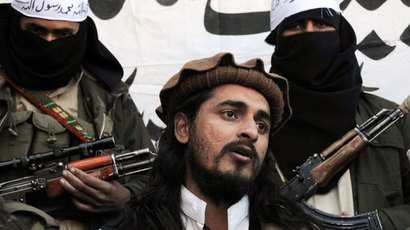Pakistan accuses US of 'scuttling' Taliban talks with drone strike, summons ambassador

The Pakistani government has accused the US of "scuttling" efforts towards peace talks with the Taliban after their militant leader was killed in a "counter-productive” drone strike on Friday. The US ambassador has been summoned over the issue.
"Brick by brick in the last seven weeks we tried to evolve a
process by which we could bring peace to Pakistan and what have
you (the US) done?" Pakistan's Interior Minister, Chaudhry
Nisar, Ali Khan said. "You have scuttled it on the eve,
18 hours before a formal delegation of respected ulema (religious
scholars) was to fly to Miranshah and hand over this formal
invitation."
He said that following Friday's drone attack "every aspect" of
cooperation with Washington would be reviewed.
"The government of Pakistan does not see this drone attack as an attack on an individual but as an attack on the peace process," Khan said.
On Saturday the Taliban has elected Khan Said Sajna aka Khalid as
the next chief of the militant group, local media report.
Khan Said Sajna aka Khalid has been appointed by the Taliban's
Shura Council after 43 out of 60 members voted in favor of the
second-in-command to replace Mehsud. 17 others voted against him,
militant sources told the Pakistani Dawn News newspaper.
However, the election has not yet been confirmed by several
splinter groups of the militant organization.
Reportedly, the council was initially considering four names for
the post - Khan Said, Umar Khalid Khurasani, Mullah Fazlullah and
Ghalib Mehsud.
Not much is known about Sajna, 36. He was the South Waziristan
Taliban chief and was responsible for TTP operations in the
region. He used to be a trusted lieutenant of Mehsud.
Said is believed to have masterminded an attack on a jail in
north-west Pakistan that freed nearly 400 prisoners in 2012 and
an attack on a Pakistani air force base in the same year.
“Sajna has no basic education, conventional or religious, but
he is battle-hardened and has experience of fighting in
Afghanistan,” an unnamed official, earlier cited by local
Dawn News.
A spokesman for the Taliban in South Waziristan, Azam Tariq,
declined to say whether Khan Said Sajna had been chosen to lead
the TTP umbrella group, the Dawn reports. A formal announcement
will be made in the coming days, the spokesman said.
Meanwhile, Pakistani Taliban fighters have vowed a wave of
suicide bombs in revenge for the killing of Hakimullah Mehsud.
"Every drop of Hakimullah's blood will turn into a suicide
bomber," Tariq said. "America and their friends shouldn't
be happy because we will take revenge for our martyr's
blood."
Mehsud, who had a $5 million US bounty on his head and was
believed to be responsible for the deaths of thousands of people,
has been secretly buried along with the four others killed - his
bodyguard, driver, uncle and a commander, AFP reports referring
to a senior Taliban source.
He had been reported dead several times before. In February 2010,
multiple sources said he had died after being hit in a drone
strike in Pakistan, and in April that year reports that he was
alive surfaced. In May 2010, he appeared in a video, vowing
attacks on major US cities.
Mehsud became leader of the Pakistani Taliban in 2009, aged 30,
after the group’s leader Baitullah Mehsud died in a US drone
strike in South Waziristan.
Seen as a hardliner, Hakimullah Mehsud supervised some of the
Tehreek-e-Taliban Pakistan’s (TTP) most high-profile attacks. He
is said to be behind the attempt to kill schoolgirl education
activist, Malala Yousafzai, in October last year.
‘Counter-productive killing’
Pakistan’s government has “strongly condemned the US drone
strike” and called it “counter-productive”.
The killing of Mehsud has cast doubt over proposed peace talks
between the Pakistani government and the militant group.
“It makes the peace dialogue process with the Taliban
difficult. Now that Mehsud’s been killed, they won’t be prepared
to have a dialogue with us any longer. So how can we carry on
with it?” one of the locals has told the media.
However, the country’s Information Minister gave assurances in a
statement that the attack will not delay peace talks.
“The US has tried to attack the peace talks with this drone
but we will not let them fail," Pervez Rashid told media,
referring to the negotiations, which the Taliban said on Friday
had yet to start.
In response to the attack local tribesmen opened fire on a US
drone over Pakistan's tribal belt, where Hakimullah Mehsud was
killed.
"Tribesmen and militants were firing with light and heavy guns
for an hour," Tariq Khan, a shopkeeper in Miranshah was cited
by AFP. "Local people are scared. The death of Hakimullah
Mehsud has created uncertainty. Everyone is talking about Taliban
revenge," Khan said.














